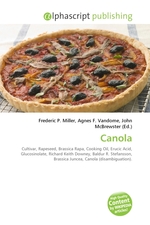Canola
Frederic P. Miller, Agnes F. Vandome, John McBrewster
бумажная книга
Canola is one of two cultivars of rapeseed or Brassica campestris (Brassica napus L. and B. campestris L.). Their seeds are used to produce edible oil that is fit for human consumption because it has lower levels of erucic acid than traditional rapeseed oils and to produce livestock feed because it has reduced levels of the toxin glucosinolates. Canola was originally naturally bred from rapeseed in Canada by Keith Downey and Baldur R. Stefansson in the early 1970s, but it has a very different nutritional profile in addition to much less erucic acid. The name "canola" was derived from "Canadian oil, low acid" in 1978. A product known as LEAR (for low erucic acid rapeseed) derived from cross-breeding of multiple lines of Brassica juncea is also referred to as canola oil and is considered safe for consumption.
Данное издание не является оригинальным. Книга печатается по технологии принт-он-деманд после получения заказа.


